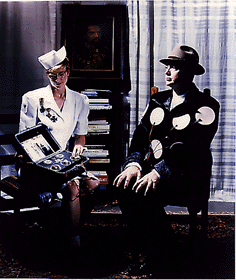Laurence Rickels Online


"More than anything else in society, mourning must be diluted and distilled; the corpse is beautiful and the 'hardened survivors' odor free. Alongside this disturbed relationship to the dead, mass media culture conducts that endless work of mourning Freud called melancholia. ... The cult of the dead in any given culture is coextensive with the media extensions of the senses current in that culture. Psychoanalysis, our culture's institution of mourning, keeps open lines of communication with the deceased which are precisely lines of telecommunication. Freud's disinterment of the phantom voices of the superego, for example, coincides with the advent of phonographic or radio recording... just as photography and film project and animate those phantoms which, in Totem and Taboo, haunt those who are unable to grant the dead proper burial."
(Aberrations of Mourning, 1988)
"This book shatters the iron collar of German Studies in America. [...] In the era following Viet Nam, schizonomadic thought and the technological incursions of the media, Aberrations of Mourning offers an urgently timely meditation on our cryptological era." - Avital Ronell
"California is where unending mourning achieves its society-wide manifestation (or massification) as sado-masochism, where the death wish yields to death drive (which takes a detour via suicide), and where the femininity of mourning constitutes the group's secret agenda, gender, and desire. The psychohistory that documents the intellectual migrations to the most modern of frontiers cannot but unfold or fold out a psychology of the ultimate idol of Freud's second system: the adolescent or Californian. But the two anchorpersons for this special report on California - Kafka and Thomas Mann - have been selected, according to the bicoastal logic of this case, from among Germanicity's teenagers at heart. In between: television covers the ins and outs of this psychoanalytic investigation of a global conspiracy - the Californian (and German) invention of adolescence."
(The Case of California, 1991)
"The Case of California is one of the most powerful attempts we have so far to establish connections between contemporary culture and certain German texts that are inseparable from modernity." - Samuel Weber
"Nazi Psychoanalysis, which marks the final installment of my trilogy on 'Unmourning', is committed, over and again, to the excavation of a missing era in all its materiality. In the course of the dig, as they all rose to consciousness, the materials kept on putting in uncanny connections between so many of the split-off, discontinuous segments of our standard tradition or reception of good modernism, good psychoanalysis. The influence we now see come out in the wash of materials overflowing from the nonstop productions of the military psychological complex relies on a sense of audience that puts on Freudian ears to listen behind the lines: out of the noisy wear and tear of resistance there emerges one genuine line of influence, the kind that represents real change. A clean tranferential cutting in of 'the father', say, into the place of the analyst or therapist can promote the immediate cause of healing; but in matters of influence, a matter psychoanalysis alone made an issue of its science, also in the sense that there was no influence until we learned how to interpret for the transference, the resistance, the defense, the intactness of a foreign corpus inside another's identity or identification indeed symptomatizes a host or ghost of issues, but does not, finally, give the measure of any influence. The least likely place to look, therefore, which was where previous studies of the Nazi history of psychoanalysis and the psychodynamic therapies tended to start and stop, is that small band of certified analysts who stayed on in Germany after 1933 [...]"
(Nazi Psychoanalysis, 2002)
[ Index | Biblio | Texts | CV ]